 A noteworthy change to Facebook’s branded content guidelines brings important ramifications to influencer marketing on the world’s largest social media network.
A noteworthy change to Facebook’s branded content guidelines brings important ramifications to influencer marketing on the world’s largest social media network.
Facebook recently announced that all verified Facebook Pages can now share branded content, defined as any post that mentions a product, brand or sponsor. Until now, such posts violated the network’s guidelines.
Publishers and influencers must tag the brand with Facebook’s tool. The top of the post will display a line with the name of the brand: such as “Lady Gaga with Intel.” The tag allows the network to notify the marketer of the post and obtain post-level insights.
The tags also enable the network to collect data on branded content, which will be useful if it does decide to charge a fee, as Marketing Land noted.
Brands may need to re-evaluate and possibly increase their earned media budgets. “The ability to promote influencer content directly with our own ad dollars is not insignificant!” says Christopher Penn, vice president marketing technology, at Shift Communications. “If you don’t already have a sizable portion of your ad budget allocated to boosting earned media content with paid advertising, now would be the time to reallocate those dollars.”
The change makes public relations skills and placements more important in utilizing social media for marketing.
What’s Prohibited
Facebook’s branded content guidelines prohibit overly promotional features. Cover photos and profile pictures cannot feature third-party products, brands, or sponsors. Permitted branded content include content like product placements, end cards and marketer’s logos.
Despite the restrictions, the policy change could open flood gates for influencer marketing, especially since publishers and influencers are not required to hand over part of their income to Facebook — especially considering Facebook is the largest social network with over 1.39 billion monthly active users.
More data — More Pricing Power
The tags will provide marketers an abundance of measurement data. The capability to obtain data directly from Facebook rather than from influencers will change influencer pricing. “While many influencers are honorable and ethical, there are a few who inflate their numbers to command higher prices. At least on Facebook, that game is now over,” Penn says.
The new policy opens opportunities for nascent, rising influencers. Instead of paying a single influencer a large sum, marketers may be more inclined to split their budget among smaller influencers and perhaps targeted ads, he says.
Because marketers will know which posts gain the most reach and engagement, they will be able to hold influencers more accountable. Influencers will feel more pressure to be consistently influential. In addition, companies will likely pressure other social media networks to offer similar analytical capabilities, especially if it produces cost savings.
New Rules for the Game
“For public relations professionals who work with influencers and broker relationships between influencers and brands, we must acknowledge that the rules of the game have changed. New data means new transparency, and that means our methods of identifying and managing influencers must also change,” Penn wrote.
The new guidelines are also good news for publishers. “Being able to post that branded content on Facebook means publishers can sell Facebook reach as a part of their advertising products — without fear of punishment from Facebook,” states the Nieman Journalism Lab.
Bottom Line: Facebook’s new guidelines on branded content will open the flood gates for influencer marketing and branded content. Because of the network’s restrictions on content, PR may take a leading role in created content for Facebook marketing. Other platforms may feel compelled to improve their data collection in response to Facebook’s move.
William J. Comcowich founded and served as CEO of CyberAlert LLC, the predecessor of Glean.info. He is currently serving as Interim CEO and member of the Board of Directors. Glean.info provides customized media monitoring, media measurement and analytics solutions across all types of traditional and social media.




